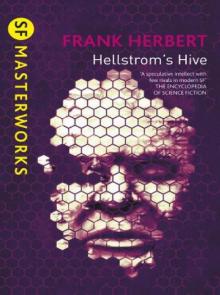- Home
- Frank Herbert
Four Unpublished Novels Page 2
Four Unpublished Novels Read online
Page 2
Why not? thought Movius. He shrugged, slipped into the car, felt the solid assurance of the slamming door. Navvy took his place in front.
“Where to, sir?”
“The apartment, I guess.”
Navvy flicked the power-receiver switch, turned to back the car from its slot. Movius watched the concentration on the man’s face. That was one of Navvy’s secrets, a power of concentration, of storing up. But what about the other secret?
“Why won’t you tell me how you came by the information?”
“You’d only accuse me of being a separatist again.”
Movius felt a humorless smile twitch at his lips, remembering their conversation that morning on the way from the apartment. Navvy had said, “Sir, probably I shouldn’t be talking, but I’ve word they’re going to low-opp you today.”
It had been an ice-water statement, doubly confusing because it came from his driver, someone like an extension of the car.
“Nonsense! Silly scuttlebutt!”
“No, sir. It’s over the grapevine. The question was put on the eight o’clock.”
Movius glanced at his watch. Ten minutes to nine. They almost always were passing the Bu-Psych Building about this time. He turned. There was the grey stone pile, early workers streaming up the steps.
A question on the eight o’clock? Movius could picture the returns ticking into the computers—Shanghai, Rangoon, Paris, New York, Moscow.… The Comp Section, working at top speed, could have results in two hours. It was impossible that anyone could know the results of an eight o’clock before ten. He explained this fact to Navvy.
“You’ll see,” said Navvy. “Those autocratic High-Opps have you picked for the long slide down.”
And Movius remembered he had chuckled. “The government doesn’t function that way, Navvy. Majority opinion rules.”
What a trite set of mouthing’s those were when he thought back on them. Right out of the approved history books. Right out of the Bureau of Information blathering. But these thoughts brought a sense of uneasiness. He twisted his lapel, looked down at the pale mauve and white of his coveralls, code colors for Tertiary Bureau heads. All of his clothes would have to be dyed. He fingered his identification number on the lapel, the red ‘T’ stitched above the number. That would be ripped off, “LP” replacing it.
Labor Pool! Damn them!
Penalty service could scarcely be worse.
The car was climbing through the privileged section now, Gothic canyons of silvery stone interspersed with green parks. There was an air of seclusion and reserved quiet in the privileged sections never found in the bawdy scrambling of the Warrens.
Movius wondered if the word already was out to his apartment manager.
Chapter Two
The Bureau of Psychology had a special suite of rooms atop its building on Government Avenue, fronting the river. In the forenoon, the ledges outside the office windows were a roosting place for pigeons which watched the riverbanks and the streets for signs of food. A flock of them strutted along the ledges, cooing, brushing against one another. The sound carried through an open window into one of the rooms.
Two walls of this room were taken up by charts covered with undulant squiggles in colored inks. In the center of the room, spread out on a table, was another chart bearing a single red line, curving, dipping, ending in the middle of the sheet like an uncompleted bridge. A white card rested on this chart near the red line’s terminus. One corner of the card was weighted by a statuette of an obscene monkey labeled “High-Opp.” A strictly subversive, forbidden statuette.
Three people occupied the room—two men and a woman. Or, rather, they inhabited the room. They seemed fitted to it by an attitude of absorption. One got the feeling they had been initiated into the secrets of this room through a deeply esoteric ritual.
Nathan O’Brien, chief of Bu-Psych, stood up, closed the window to shut out the noise of the pigeons. He returned to his chair at the end of the table. O’Brien was a ferret of a man, who wore his Top Rank black with an air of mourning. He had the reputation of possessing a photographic memory, was conversant with seven of the pre-Unity languages, and was said to have a giant library of forbidden books of the ancients. Things were rumored of him that one would expect to hear about a man whose position could command privacy. There was about him a sense of remoteness, as though thoughts passed between his greying temples that no other men could fathom.
Quilliam London was a snorter. He snorted now, meaning he had been about to get up and close the window himself. Damned pigeons! He did not sit his chair, he rode it as though it were on a pedestal or a podium. Quilliam London had once been a professor of semantics before such teaching was low-opped and a heavy penalty put on infractions. Now he was on the retired rolls, serving an occasional afternoon at his district infirmary, filling out treatment cards, or visiting Nathan O’Brien at Bu-Psych, an activity carried out quietly. He was a rail of a man with the face of an eagle and hunter’s eyes. His seventy years were carried as though they were fifty. Thin wrinkles down his cheeks, thickening veins and greying hair gave him away, however, as did a tendency to be short of temper when talking with anyone under thirty.
Grace London, Quilliam’s daughter, turned away from the window where she had been watching the pigeons. She had rather enjoyed their cooing and was sorry when O’Brien closed the window. She was a woman with too much of her father’s thinness of face to be beautiful and people often were disconcerted by her habit of turning a piercing stare on whomever she addressed. There was youth in her, though, and the kind of sureness which comes with health and vitality. It gave her a sparkle, a crispness which some men found attractive.
“I believe he’s the man,” said O’Brien. He nodded toward the chart on the table.
“That’s been said before, Nathan.” His voice rumbled.
“But this time there’s a higher probability,” said O’Brien. “Look at his sorter card. Loyalty index ninety-six point six. Intelligence in the genius range. His decision chart is around here somewhere. Six questionables in twelve years.”
Grace London moved restlessly along the table, following the red line on the cart with a finger. “What does Cecelia say? Is he another Brownley?”
O’Brien looked up at her as though she had interrupted a thought. “She says not. She’s been watching him four years now, and her opinion is pretty trustworthy. We’ve just run a Malot-final on him from her completed reports. It’s uncanny how closely he fits the classic requirements.”
“I’m being overly cautious,” said Grace. “Brownley was such a disappointment.” She moved the monkey statuette to a more central position on the chart.
“Brownley was a result of poor timing on our part,” said O’Brien. “We were too eager.”
Quilliam London scratched his chin with his thumb. “That high loyalty index could backfire on us. With our treatment, Movius might turn it inward, go all out for number one.”
“That’s the chance we take,” said O’Brien. “Even if that does happen, he’d be useful to us up to a point. We could get rid of him, blame his death on.…”
A door behind him opened and a blond man stepped into the room. “Chief, Cecelia Lang called. Movius just left her apartment. She says everything went off as planned.”
O’Brien straightened. “Get moving, Grace. You have to beat him to the Warren. I’ll have supply rush a make-up kit down to the car. You can change on the way.” He brushed a hand through his thinning hair. “Wouldn’t want Bu-Con recognizing you out there and asking questions.”
She nodded, followed the blond man out the door.
Quilliam London arose like a folding ruler being stretched to its limit. “I’d best be getting along, too. Has Marie Cotton been warned to look out for Movius?”
“She was in yesterday,” said O’Brien. “She had a relayed report on Warren Gerard and the latest Bu-Trans maneuvering.”
“That’s a funny thing about Gerard,” said Quilliam London. “What p
rompted him to send those specifications through the sorter at this particular time?” He pointed to the card on the table. “Gerard is going to be surprised when he finds out who his specifications fit.” He rapped a knuckle against the chart on the table. “This Movius is encouraging. I’ll have a long talk with the man tonight, see if he measures up to his psych card and to Navvy’s judgment.”
“He had better be right,” said O’Brien. “We don’t have time for another wrong move like Brownley.”
Chapter Three
Navvy let Movius out of the car half a block from the apartment. “You understand, sir. No sense rubbing their noses in it.”
“Yes. Good opps, Navvy.” Movius stood a moment on the curb, watching the car grow smaller, finding it difficult to realize that had been the last ride. His watch showed almost eleven. He turned, hurried toward the grill and glass front of the apartment building. In the lobby there was an atmosphere of refined gloom, thick carpet underfoot, a whirring of air-conditioning fans.
The manager had been notified. He darted across the lobby as Movius entered. “Oh, Movius?”
Now it’s just plain Movius, he thought. It used to be Mr. Movius. That glorified janitor!
“You no longer live here, Movius.” The manager’s face reminded him of a rabbit, a particularly gloating rabbit. “I have your new address right here.” He handed Movius a narrow strip of paper torn from a notepad.
Movius glanced at it, read: “Roper Road, 8100-4790DRB.” A Warren! Well, he’d expected that. DR for downstairs rear, B for bachelor. No tick rug in the lobby there; bare to the hard tiles. No isolation there; turmoil. A Warren.
The manager stood looking at him, obviously enjoying his discomfiture. “Your effects already have been moved.”
Already moved! he thought. Scarcely two hours and already moved. As though they wanted to cover him up, like an unsightly mistake.
“Was there any mail for me?” asked Movius.
“No, but I believe there was a tele-message on the printer. Just a moment.” He walked around a corner, returned with another piece of paper.
The note was brief:
Dan,
Just got the word. Comp Section still needs good hands. We could put through a special request.
—Phil Henry.
Movius put the note in his pocket. Phil Henry. How long had it been? With a feeling of guilt, Movius realized he had not seen Phil Henry for almost a year. He remember the bushy-browed eager look of the man when they’d worked together back in Comp. Almost a year. Movius shook his head, turned to the manager.
“Is Miss Lang in her apartment? I’d like to see her.”
“Miss Lang?”
The anger came out in his voice. “Yes, Miss Lang. She wasn’t at work. I’d like to know if she’s home.”
“I’ll see if Miss Lang wishes to see you,” said the manager. He went into his cubbyhole. Movius heard him talking on the phone.
One of the privileges of Upper Rank quarters, thought Movius. No unauthorized visitors. Ergo: he had to ask permission to visit his fiancée. He wondered what would happen to her now. Probably a quick shift into another section. Only the top felt the heavy blow of a low-opp. Trained underlings were always needed somewhere.
The manager spent a long time on the phone, finally emerged, grinned at Movius before speaking. “You may go up.” The grin was a positive smirk.
Movius went to the elevator, punched for the thirty-third floor. Why hadn’t Cecelia been at the office? She seldom failed to report on time, often rode down with him. Movius thought of all the effort he had put out to get her this apartment next to his, the favors he had promised, the extra credits spent. And Cecelia only a twelfth ranker. That had made it difficult.
The elevator stopped, the door snicked back. Movius turned left, passed his own door, 3307, saw it was open and a cleaning crew working inside. The urge to pause and have a last look around the rooms swept over him. But he couldn’t face the thought of explaining to the cleaning crew, accepting their smiles of superiority. He turned away, noticed two men loitering in the doorway opposite ’07, Cecelia’s apartment. One of the men looked familiar. He had seen the fellow somewhere. The two men showed interest in Movius as he knocked on Cecelia’s door. One moved across the hall, hand in pocket. “Just a …”
The door opened, revealing Cecelia—chic, blonde, wearing dress coveralls the color of her hair. Her mouth was startling with a wild orange lipstick. The effect was a gold statue come to life.
Movius stepped forward to take her in his arms, ignored the man behind him. “Cecie, I …”
She put him off, extending her right hand as though for him to kiss. With her other hand she waved away the man in the hall. “Dan, how nice you could come by. Come in, won’t you? I’ve a guest.” She took his hand.
There’s something wrong with her voice, thought Movius. He said, “Who was that in the hall?”
“Nobody important; come along.” She led him into the apartment.
A wide-bodied man with crew-cut iron-grey hair and a face like a square-hewn plank stood up from the couch. He was putting a handkerchief into a side pocket. The handkerchief showed orange stains the color of Cecelia’s lipstick. Movius paused. Now he knew the reason for the men in the hall. Bodyguards. This was Helmut Glass, Coordinator of All Bureaus: The Coor. Although the directors of the top bureaus shared nearly equal powers, this man was titular head of government, the top of the pyramid.
“Sorry about your job,” said Glass. His left eye squinted, the muscles of the cheek rippling with a nervous tic. “I just heard about it a couple of hours ago.”
On the tip of Movius’ tongue was the urge to say, “Then my driver knew it before you did.” But his thoughts skipped a beat. It was now eleven o’clock. Two hours subtracted from eleven left nine o’clock, about the same time Navvy had been making the prediction. The Coor could not have known two hours ago unless his information came from a source similar to Navvy’s or from foreknowledge. But how could he predict the Opp?
“Just about two hours ago,” repeated Glass. “I was shocked.”
He’s emphasizing the point, thought Movius. It’s a calculated lie. And how could Glass be shocked at the knowledge? He and the other top bureau chiefs—Com-Burs—had framed the question. The man wants me to lose my temper, thought Movius. He wants me to call him a liar. Sorry, Mr. Glass.
In an even tone, Movius said, “That gave you just enough time to get over here and comfort Cecie, didn’t it?”
The Coor’s eyes widened, narrowed. “Cecelia …” He turned toward her.
Cecelia stepped to one side, said, “Helmut has transferred me to his department. Isn’t that lucky? Now I won’t lose my apartment.”
Not The Coordinator has transferred me … Isn’t this cozy? And dear Helmut received a big kiss when he made the announcement.
Glass put a lighter flame to the cigaret, looked at Movius through a blue cloud of smoke—distant, untouchable. “We can always use a good secretary. When I heard your department was low-opped and Cecelia out of a job, I snapped her up.” A streamer of cigaret smoke blew toward Movius. “Don’t know what we’re going to do about you, Dan. Something will probably turn up, though.” Again the tie rippled the Coor’s cheek, squinted his eye.
So it’s Helmut and Cecelia, thought Movius. He looked at Cecelia, wondering how he could get her away alone to talk to her. Something about the way she was looking at him—half laughing, superior—reminded him of a fact buried far down in his memory. Cecelia Lang had been engaged to another man once. What was the fellow’s name? Brownley or something like that. He’d been the head of the now defunct Department of Antiquities and had gone out and gotten himself into one of the penalty services for failure to report the discovery of an ancient library. And now that he thought about it, Movius recalled that Cecelia had been transferred to Liaison the day after what’s-his-name Brownley was low-opped.
Looking at Cecelia with her cream-washed skin and eyes he could neve
r see past, Movius thought, I inherited her.
He said, “I was wondering if I could see you tonight.”
A perfectly formed look of disappointment came onto her face. He had the sudden disquieting picture of Cecilia practicing that look before her mirror. “Oh, I’m sorry,” she said, “but Helmut has asked me …”
“Tonight is Summer Festival,” said Glass. “Had you forgotten? Cecelia said you hadn’t asked her; so I invited her.”
It wasn’t what they said nor even their actions—taken singly. It was a combination of things more subtle than gross perception is accustomed to noting. Movius felt a wall descend between himself and these two. So this was how Brownley had felt. Sorry, Brownley. I didn’t know. For a moment, Movius failed to recognize the feelings inside himself—the tension like hunger. Then he knew it—hate, a boiling hurt, struggling for expression. He thrust his hands into his pockets, clenched his fists.
“You do see, don’t you?” asked Cecelia. Again that vague hint of superior laughter.
“I see,” said Movius, startled to find his voice high-pitched. Glass looked up sharply, smiled. “I’ll be going now,” said Movius.
Cecelia turned away. Glass grinned at him, insolent, assured. Only the tic, briefly touching the man’s cheek hinted at something less than assurance.
Movius whirled, almost ran from the room, not seeing, moving by memory. He was in the Common Transport headed for his new address in the Warrens before he could calm his nerves.
Without using a word that could be challenged, Cecelia had just given him the gate. He recognized that she had done the job with a masterful touch. It was typical of her, typical of the way she had always handled him, holding him a tantalizing arms-length away even after they were engaged.
A maddening woman. And what did he really know about her? The name—Cecelia Lang. The lovely, enticing body. But he didn’t know that except from looking at her and longing. Many men had enjoyed that privilege. What else did he know about her? Now that he put it to the question, he realized there was a little else he knew about Cecelia Lang. She had never talked about her parents except to say that once her mother had possessed the morals of slum goat. Maybe she’d never known her father. From all Cecelia had ever said about herself, she might well have started life at the age of twenty-one. Or perhaps at nineteen. He seemed to remember hearing somewhere that she’d known Brownley two years. Brother Brownley.

 Direct Descent
Direct Descent The Ascension Factor
The Ascension Factor The Heaven Makers
The Heaven Makers Children of Dune
Children of Dune Old Rambling House
Old Rambling House Dune
Dune The Worlds of Frank Herbert
The Worlds of Frank Herbert The Jesus Incident
The Jesus Incident Heretics of Dune
Heretics of Dune Whipping Star
Whipping Star Dune Messiah
Dune Messiah Man of Two Worlds
Man of Two Worlds The Book of Frank Herbert
The Book of Frank Herbert Hunters Of Dune
Hunters Of Dune The Tactful Saboteur
The Tactful Saboteur Soul Catcher
Soul Catcher God Emperor of Dune
God Emperor of Dune The White Plague
The White Plague The Green Brain
The Green Brain The Godmakers
The Godmakers Sandworms of Dune
Sandworms of Dune Destination Void
Destination Void The Dosadi Experiment
The Dosadi Experiment Eye
Eye High-Opp
High-Opp The Eyes of Heisenberg
The Eyes of Heisenberg Missing Link
Missing Link Hellstrom's Hive
Hellstrom's Hive Chapterhouse: Dune
Chapterhouse: Dune The Santaroga Barrier
The Santaroga Barrier The Dragon in the Sea
The Dragon in the Sea Operation Haystack
Operation Haystack A Thorn in the Bush
A Thorn in the Bush Four Unpublished Novels
Four Unpublished Novels Dune dc-1
Dune dc-1 Jorj X. McKie 1 - Whipping Star
Jorj X. McKie 1 - Whipping Star DV 4 - The Ascension Factor
DV 4 - The Ascension Factor Frank Herbert - Dune Book 4 - God Emperor Of Dune
Frank Herbert - Dune Book 4 - God Emperor Of Dune ChapterHouse: Dune dc-6
ChapterHouse: Dune dc-6 The Ascension Factor w-4
The Ascension Factor w-4 A Game of Authors
A Game of Authors Children of Dune dc-3
Children of Dune dc-3 Destination: Void: Prequel to the Pandora Sequence
Destination: Void: Prequel to the Pandora Sequence The Collected Stories of Frank Herbert
The Collected Stories of Frank Herbert Dune Messiah dc-2
Dune Messiah dc-2 Frank Herbert - Dune Book 5 - Heretics of Dune
Frank Herbert - Dune Book 5 - Heretics of Dune DV 3 - The Lazarus Effect
DV 3 - The Lazarus Effect The Jesus Incident w-2
The Jesus Incident w-2 The Lazarus Effect w-3
The Lazarus Effect w-3 Frank Herbert
Frank Herbert The Ascension Factor: Pandora Sequence
The Ascension Factor: Pandora Sequence Dune (40th Anniversary Edition)
Dune (40th Anniversary Edition) The Dosadi Experiment c-2
The Dosadi Experiment c-2 The Lazarus Effect
The Lazarus Effect God Emperor of Dune dc-4
God Emperor of Dune dc-4 The Pandora Sequence: The Jesus Incident, the Lazarus Effect, the Ascension Factor
The Pandora Sequence: The Jesus Incident, the Lazarus Effect, the Ascension Factor The Green Brain (v4.0)
The Green Brain (v4.0) The Heaven Makers (v4.0)
The Heaven Makers (v4.0) Heretics of Dune dc-5
Heretics of Dune dc-5